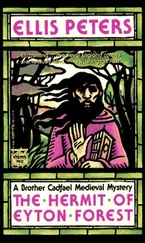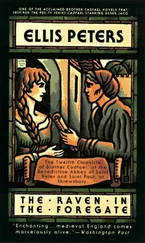Ellis Peters - The Devil's Novice
Здесь есть возможность читать онлайн «Ellis Peters - The Devil's Novice» весь текст электронной книги совершенно бесплатно (целиком полную версию без сокращений). В некоторых случаях можно слушать аудио, скачать через торрент в формате fb2 и присутствует краткое содержание. Жанр: Старинная литература, на английском языке. Описание произведения, (предисловие) а так же отзывы посетителей доступны на портале библиотеки ЛибКат.
- Название:The Devil's Novice
- Автор:
- Жанр:
- Год:неизвестен
- ISBN:нет данных
- Рейтинг книги:3 / 5. Голосов: 1
-
Избранное:Добавить в избранное
- Отзывы:
-
Ваша оценка:
- 60
- 1
- 2
- 3
- 4
- 5
The Devil's Novice: краткое содержание, описание и аннотация
Предлагаем к чтению аннотацию, описание, краткое содержание или предисловие (зависит от того, что написал сам автор книги «The Devil's Novice»). Если вы не нашли необходимую информацию о книге — напишите в комментариях, мы постараемся отыскать её.
The Devil's Novice — читать онлайн бесплатно полную книгу (весь текст) целиком
Ниже представлен текст книги, разбитый по страницам. Система сохранения места последней прочитанной страницы, позволяет с удобством читать онлайн бесплатно книгу «The Devil's Novice», без необходимости каждый раз заново искать на чём Вы остановились. Поставьте закладку, и сможете в любой момент перейти на страницу, на которой закончили чтение.
Интервал:
Закладка:
So that must be Leoric Aspley of Aspley, thought Cadfael, and the son who desires to take the cowl here among us. And he stood to gaze a moment, partly out of curiosity, partly out of a vain hope that the downpour would ease, and let him cross to the scriptorium without getting wetter than he need.
A tall, erect, elderly man in a thick cloak led the arrivals, riding a big grey horse. When he shook off his hood he uncovered a head of bushy, grizzled hair and a face long, austere and bearded. Even at that distance, across the wide court, he showed handsome, unsmiling, unbending, with a high-bridged, arrogant nose and a grimly proud set to his mouth and jaw, but his manner to porter and groom, as he dismounted, was gravely courteous. No easy man, probably no easy parent to please. Did he approve his son’s resolve, or was he accepting it only under protest and with displeasure? Cadfael judged him to be in the mid-fifties, and thought of him, in all innocence, as an old man, forgetting that his own age, to which he never gave much thought, was past sixty.
He gave rather closer attention to the young man who had followed decorously a few respectful yards behind his father, and lighted down from his black pony quickly to hold his father’s stirrup. Almost excessively dutiful, and yet there was something in his bearing reminiscent of the older man’s stiff self-awareness, like sire, like son. Meriet Aspley, nineteen years old, was almost a head shorter than Leoric when they stood together on the ground; a well-made, neat, compact young man, with almost nothing to remark about him at first sight. Dark-haired, with his forelocks plastered to his wet forehead, and rain streaking his smooth cheeks like tears. He stood a little apart, his head submissively bent, his eyelids lowered, attentive like a servant awaiting his lord’s orders; and when they moved away into the shelter of the gatehouse he followed at heel like a well-trained hound. And yet there was something about him complete, solitary and very much his own, as though he paid observance to these formalities without giving away anything more, an outward and scrupulous observance that touched no part of what he carried within. And such distant glimpses as Cadfael had caught of his face had shown it set and composed as austerely as his sire’s and deep, firm hollows at the corners of a mouth at first sight full-lipped and passionate.
No, thought Cadfael, those two are not in harmony, that’s certain. And the only way he could account satisfactorily for the chill and stiffness was by returning to his first notion, that the father did not approve his son’s decision, probably had tried to turn him from it, and held it against him grievously that he would not be deterred. Obstinacy on the one hand and frustration and disappointment on the other held them apart. Not the best of beginnings for a vocation, to have to resist a father’s will. But those who have been blinded by too great a light do not see, cannot afford to see, the pain they cause. It was not the way Cadfael had come into the cloister, but he had known it happen to one or two, and understood its compulsion.
They were gone, into the gatehouse to await Brother Paul, and their formal reception by the abbot. The groom who had ridden in at their heels on a shaggy forest pony trotted down with their mounts to the stables, and the great court was empty again under the steady rain. Brother Cadfael tucked up his habit and ran for the shelter of the cloister, there to shake off the water from his sleeves and cowl, and make himself comfortable to continue his reading in the scriptorium. Within minutes he was absorbed in the problem of whether the ‘dittanders’ of Aelfric was, or was not, the same as his own ‘dittany’. He gave no more thought then to Meriet Aspley, who was so immovably bent on becoming a monk.
The young man was introduced at chapter next day, to make his formal profession and be made welcome by those who were to be his brothers. During their probation novices took no part in the discussions in chapter, but might be admitted to listen and learn on occasions, and Abbot Radulfus held that they were entitled to be received with brotherly courtesy from their entry.
In the habit, newly donned, Meriet moved a little awkwardly, and looked strangely smaller than in his own secular clothes, Cadfael reflected, watching him thoughtfully. There was no father beside him now to freeze him into hostility, and no need to be wary of those who were glad to accept him among them; but still there was a rigidity about him, and he stood with eyes cast down and hands tightly clasped, perhaps over-awed by the step he was taking. He answered questions in a low, level voice, quickly and submissively. A face naturally ivory-pale, but tanned deep gold by the summer sun, the flush of blood beneath his smooth skin quick to mantle on high cheekbones. A thin, straight nose, with fastidious nostrils that quivered nervously, and that full, proud mouth that had so rigorous a set to it in repose, and looked so vulnerable in speech. And the eyes he hid in humility, large-lidded under clear, arched brows blacker than his hair.
“You have considered well,” said the abbot, “and now have time to consider yet again, without blame from any. Is it your wish to enter the cloistered life here among us? A wish truly conceived and firmly maintained? You may speak out whatever is in your heart.”
The low voice said, rather fiercely than firmly: “It is my wish, Father.” He seemed almost to start at his own vehemence, and added more warily: “I beg that you will let me in, and I promise obedience.”
“That vow comes later,” said Radulfus with a faint smile. “For this while, Brother Paul will be your instructor, and you will submit yourself to him. For those who come into the Order in mature years a full year’s probation is customary. You have time both to promise and to fulfil.”
The submissively bowed head reared suddenly at hearing this, the large eyelids rolled back from wide, clear eyes of a dark hazel flecked with green. So seldom had he looked up full into the light that their brightness was startling and disquieting. And his voice was higher and sharper, almost dismayed, as he asked: “Father, is that needful? Cannot the time be cut short, if I study to deserve? The waiting is hard to bear.”
The abbot regarded him steadily, and drew his level brows together in a frown, rather of speculation and wonder than of displeasure. “The period can be shortened, if such a move seems good to us. But impatience is not the best counsellor, nor haste the best advocate. It will be made plain if you are ready earlier. Do not strain after perfection.”
It was clear that the young man Meriet was sensitive to all the implications of both words and tone. He lowered his lids again like shutters over the brightness, and regarded his folded hands. “Father, I will be guided. But I do desire with all my heart to have the fullness of my commitment, and be at peace.” Cadfael thought that the guarded voice shook for an instant. In all probability that did the boy no harm with Radulfus, who had experience both of passionate enthusiasts and those gradually drawn like lambs to the slaughter of dedication.
“That can be earned,” said the abbot gently.
“Father, it shall!” Yes, the level utterance did quiver, however briefly. He kept the startling eyes veiled.
Radulfus dismissed him with somewhat careful kindness, and closed the chapter after his departure. A model entry? Or was it a shade too close to the feverish fervour an abbot as shrewd as Radulfus must suspect and deplore, and watch very warily hereafter? Yet a high-mettled, earnest youth, coming to his desired haven, might well be over-eager and in too much of a hurry. Cadfael, whose two broad feet had always been solidly planted on earth, even when he took his convinced decision to come into harbour for the rest of a long life, had considerable sympathy with the ardent young, who overdo everything, and take wing at a line of verse or a snatch of music. Some who thus take fire burn to the day of their death, and set light to many others, leaving a trail of radiance to generations to come. Other fires sink for want of fuel, but do no harm to any. Time would discover what young Meriet’s small, desperate flame portended.
Читать дальшеИнтервал:
Закладка:
Похожие книги на «The Devil's Novice»
Представляем Вашему вниманию похожие книги на «The Devil's Novice» списком для выбора. Мы отобрали схожую по названию и смыслу литературу в надежде предоставить читателям больше вариантов отыскать новые, интересные, ещё непрочитанные произведения.
Обсуждение, отзывы о книге «The Devil's Novice» и просто собственные мнения читателей. Оставьте ваши комментарии, напишите, что Вы думаете о произведении, его смысле или главных героях. Укажите что конкретно понравилось, а что нет, и почему Вы так считаете.












